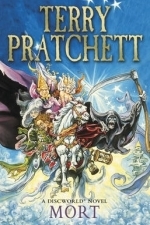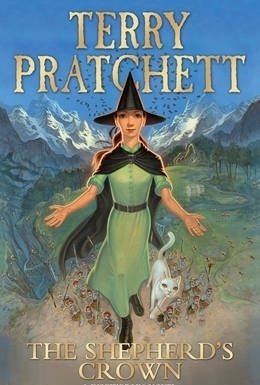Search
'Death comes to us all. When he came to Mort, he offered him a job'
An extremely early entry (#4) in [a:Terry Pratchett|1654|Terry Pratchett|https://images.gr-assets.com/authors/1235562205p2/1654.jpg]'s now-complete Discworld series (which spans 41 full length-novels), and the first in which the character of DEATH - HE WHO TALKS LIKE THIS - takes centre stage.
As this is an early novel, this is even before the introduction of DEATH's grand-daughter Susan Sto-Helit, even before the City Watch and (possibly) even before the introduction of The Witches - I say possibly as, although Granny Weatherwax has already put in an appearance in [b:Equal Rites|34507|Equal Rites (Discworld, #3; Witches #1)|Terry Pratchett|https://images.gr-assets.com/books/1407706800s/34507.jpg|583611] there's a strong argument to be made that she is not the 'real' Granny Weatherwax.
This one does, however, introduce us to DEATHs flesh-and-blood horse Binky ('He'd tried skeletal steeds, but had got tired of constantly having to stop to wire bits back together'), as well as to some of the more memorable ancillary characters who continue to appear in his later novels, such as Albert, with a large part of that character's back-story filled in here.
It may not yet be up to the standard of the mid-series Discworld novels, but you can definitely see Pratchett's style continuing to evolve, with this an improvement on those that had come before.
An extremely early entry (#4) in [a:Terry Pratchett|1654|Terry Pratchett|https://images.gr-assets.com/authors/1235562205p2/1654.jpg]'s now-complete Discworld series (which spans 41 full length-novels), and the first in which the character of DEATH - HE WHO TALKS LIKE THIS - takes centre stage.
As this is an early novel, this is even before the introduction of DEATH's grand-daughter Susan Sto-Helit, even before the City Watch and (possibly) even before the introduction of The Witches - I say possibly as, although Granny Weatherwax has already put in an appearance in [b:Equal Rites|34507|Equal Rites (Discworld, #3; Witches #1)|Terry Pratchett|https://images.gr-assets.com/books/1407706800s/34507.jpg|583611] there's a strong argument to be made that she is not the 'real' Granny Weatherwax.
This one does, however, introduce us to DEATHs flesh-and-blood horse Binky ('He'd tried skeletal steeds, but had got tired of constantly having to stop to wire bits back together'), as well as to some of the more memorable ancillary characters who continue to appear in his later novels, such as Albert, with a large part of that character's back-story filled in here.
It may not yet be up to the standard of the mid-series Discworld novels, but you can definitely see Pratchett's style continuing to evolve, with this an improvement on those that had come before.
David McK (3692 KP) rated The Shepherd's Crown in Books
Jan 28, 2019
THE FINAL DISCWORLD BOOK
Those four words were always going to make a long-time Discworld reader feel quite emotional, making it hard to objectively review the novel itself: are you reviewing this last peek into Pratchett's mirror reality, or are you reviewing the entire 41-book series? I'm going to try both:
THE SERIES
The first Disworld book I read (I'm pretty sure it was [b: Pyramids|64217|Pyramids (Discworld, #7)|Terry Pratchett|https://images.gr-assets.com/books/1439098306s/64217.jpg|968512]) wasn't actually the first in the series (that would be [b: The Colour of Magic|833512|The Colour of Magic The Illustrated Screenplay|Vadim Jean|https://images.gr-assets.com/books/1347346368s/833512.jpg|17589693]), although I did later go back and read the earlier works. Reading them in order released (as opposed to one of the numerous Discworld Reading Order Guides: I'm quite partial to the 'Unofficial Discworld Reading Order Guide'), you can see how Terry Pratchett's writing style evolved, how he moved from outright satire to a more subtle comedy fantasy that holds a mirror up to real-world issues. Personally, I feel he was at his best at around the mid-way point of the series (say, [b: Maskerade|64305|Maskerade The Play|Terry Pratchett|https://images.gr-assets.com/books/1170622047s/64305.jpg|62427] or [b: Men at Arms|7557548|Men at Arms The Play|Terry Pratchett|https://images.gr-assets.com/books/1353573652s/7557548.jpg|9910828], after he'd found his feet (so-to-speak), but before the 'embuggerance' of his posterior cortical atrophy set in and the novels - perhaps understandably - started becoming almost too serious.
Throughout the series, there was a rich tapestry of characters introduced, from CMOT Dibbler through to the Patrician of Ankh-Morpork, with certain groups of characters (e.g. The City Watch) effectively becoming a sub-series in their own right. One of those groups - Granny Weatherwax (first introduced in [b: Equal Rites|34507|Equal Rites (Discworld, #3; Witches, #1)|Terry Pratchett|https://images.gr-assets.com/books/1407706800s/34507.jpg|583611] and The Witches of Lancre (first introduced in [b: Wyrd Sisters|233664|Wyrd Sisters The Play|Terry Pratchett|https://images.gr-assets.com/books/1388363090s/233664.jpg|17589683] - would later themselves have 'guest spots' in another group of such characters, ostensibly written for Young Adult Readers but still very enjoyable for older; the Nac Mac Feegles (Crivens!) and Tiffany Aching, both of who first appeared in [b: The Wee Free Men|7881001|The Wee Free Men The Beginning (Discworld, #30 & #32)|Terry Pratchett|https://images.gr-assets.com/books/1388181365s/7881001.jpg|22017239]. Which nicely brings me to:
THE NOVEL ITSELF
'The Shepherd's Crown' sees a return of both Tiffany Aching, now a young Witch setting out on her career path, and those Nac Mac Feegles. There's a strong sense of change throughout, kicked off by the surprising early exit of a previous major character in the entire series, leading to old foes - the Elves - to try to make their way back into the world. These Elves, remember, are *not* the dainty do-gooders of Tolkien: these are nasty, malicious, self-serving creatures who last attempted to invade in [b: Lords and Ladies|34529|Lords and Ladies (Discworld, #14; Witches #4)|Terry Pratchett|https://images.gr-assets.com/books/1469186110s/34529.jpg|1185086], before eventually being defeated by Granny Weatherwax, Nanny Ogg and Magrat Garlik. Those three characters make a return in this, as well as bit-parts for the Arch-Chancellor of Unseen University, Ponder Stibbons (and HEX) alongside King Verence and the Patrician. Despite all these, the novel, however, is really Tiffany's story, and of how she finds her feet in the circumstances into which she is rather abruptly thrown. There's also a plot element that recalls [b: Equal Rites|34507|Equal Rites (Discworld, #3; Witches, #1)|Terry Pratchett|https://images.gr-assets.com/books/1407706800s/34507.jpg|583611]: that of a person wanting to do a role that is generally considered to be that for a member of the opposite sex.
As always, footnotes are present and correct, with the novel even raising a few laugh-out-loud moments. While the story does finish with the words 'THE END', the world itself will continue on: all that has come to an end is our ability to peek into it.
In the words of the Nac Mac Feegle: "Waily waily waily ..."
Rating for the series: 5*
Rating for the novel: 4*
Those four words were always going to make a long-time Discworld reader feel quite emotional, making it hard to objectively review the novel itself: are you reviewing this last peek into Pratchett's mirror reality, or are you reviewing the entire 41-book series? I'm going to try both:
THE SERIES
The first Disworld book I read (I'm pretty sure it was [b: Pyramids|64217|Pyramids (Discworld, #7)|Terry Pratchett|https://images.gr-assets.com/books/1439098306s/64217.jpg|968512]) wasn't actually the first in the series (that would be [b: The Colour of Magic|833512|The Colour of Magic The Illustrated Screenplay|Vadim Jean|https://images.gr-assets.com/books/1347346368s/833512.jpg|17589693]), although I did later go back and read the earlier works. Reading them in order released (as opposed to one of the numerous Discworld Reading Order Guides: I'm quite partial to the 'Unofficial Discworld Reading Order Guide'), you can see how Terry Pratchett's writing style evolved, how he moved from outright satire to a more subtle comedy fantasy that holds a mirror up to real-world issues. Personally, I feel he was at his best at around the mid-way point of the series (say, [b: Maskerade|64305|Maskerade The Play|Terry Pratchett|https://images.gr-assets.com/books/1170622047s/64305.jpg|62427] or [b: Men at Arms|7557548|Men at Arms The Play|Terry Pratchett|https://images.gr-assets.com/books/1353573652s/7557548.jpg|9910828], after he'd found his feet (so-to-speak), but before the 'embuggerance' of his posterior cortical atrophy set in and the novels - perhaps understandably - started becoming almost too serious.
Throughout the series, there was a rich tapestry of characters introduced, from CMOT Dibbler through to the Patrician of Ankh-Morpork, with certain groups of characters (e.g. The City Watch) effectively becoming a sub-series in their own right. One of those groups - Granny Weatherwax (first introduced in [b: Equal Rites|34507|Equal Rites (Discworld, #3; Witches, #1)|Terry Pratchett|https://images.gr-assets.com/books/1407706800s/34507.jpg|583611] and The Witches of Lancre (first introduced in [b: Wyrd Sisters|233664|Wyrd Sisters The Play|Terry Pratchett|https://images.gr-assets.com/books/1388363090s/233664.jpg|17589683] - would later themselves have 'guest spots' in another group of such characters, ostensibly written for Young Adult Readers but still very enjoyable for older; the Nac Mac Feegles (Crivens!) and Tiffany Aching, both of who first appeared in [b: The Wee Free Men|7881001|The Wee Free Men The Beginning (Discworld, #30 & #32)|Terry Pratchett|https://images.gr-assets.com/books/1388181365s/7881001.jpg|22017239]. Which nicely brings me to:
THE NOVEL ITSELF
'The Shepherd's Crown' sees a return of both Tiffany Aching, now a young Witch setting out on her career path, and those Nac Mac Feegles. There's a strong sense of change throughout, kicked off by the surprising early exit of a previous major character in the entire series, leading to old foes - the Elves - to try to make their way back into the world. These Elves, remember, are *not* the dainty do-gooders of Tolkien: these are nasty, malicious, self-serving creatures who last attempted to invade in [b: Lords and Ladies|34529|Lords and Ladies (Discworld, #14; Witches #4)|Terry Pratchett|https://images.gr-assets.com/books/1469186110s/34529.jpg|1185086], before eventually being defeated by Granny Weatherwax, Nanny Ogg and Magrat Garlik. Those three characters make a return in this, as well as bit-parts for the Arch-Chancellor of Unseen University, Ponder Stibbons (and HEX) alongside King Verence and the Patrician. Despite all these, the novel, however, is really Tiffany's story, and of how she finds her feet in the circumstances into which she is rather abruptly thrown. There's also a plot element that recalls [b: Equal Rites|34507|Equal Rites (Discworld, #3; Witches, #1)|Terry Pratchett|https://images.gr-assets.com/books/1407706800s/34507.jpg|583611]: that of a person wanting to do a role that is generally considered to be that for a member of the opposite sex.
As always, footnotes are present and correct, with the novel even raising a few laugh-out-loud moments. While the story does finish with the words 'THE END', the world itself will continue on: all that has come to an end is our ability to peek into it.
In the words of the Nac Mac Feegle: "Waily waily waily ..."
Rating for the series: 5*
Rating for the novel: 4*

